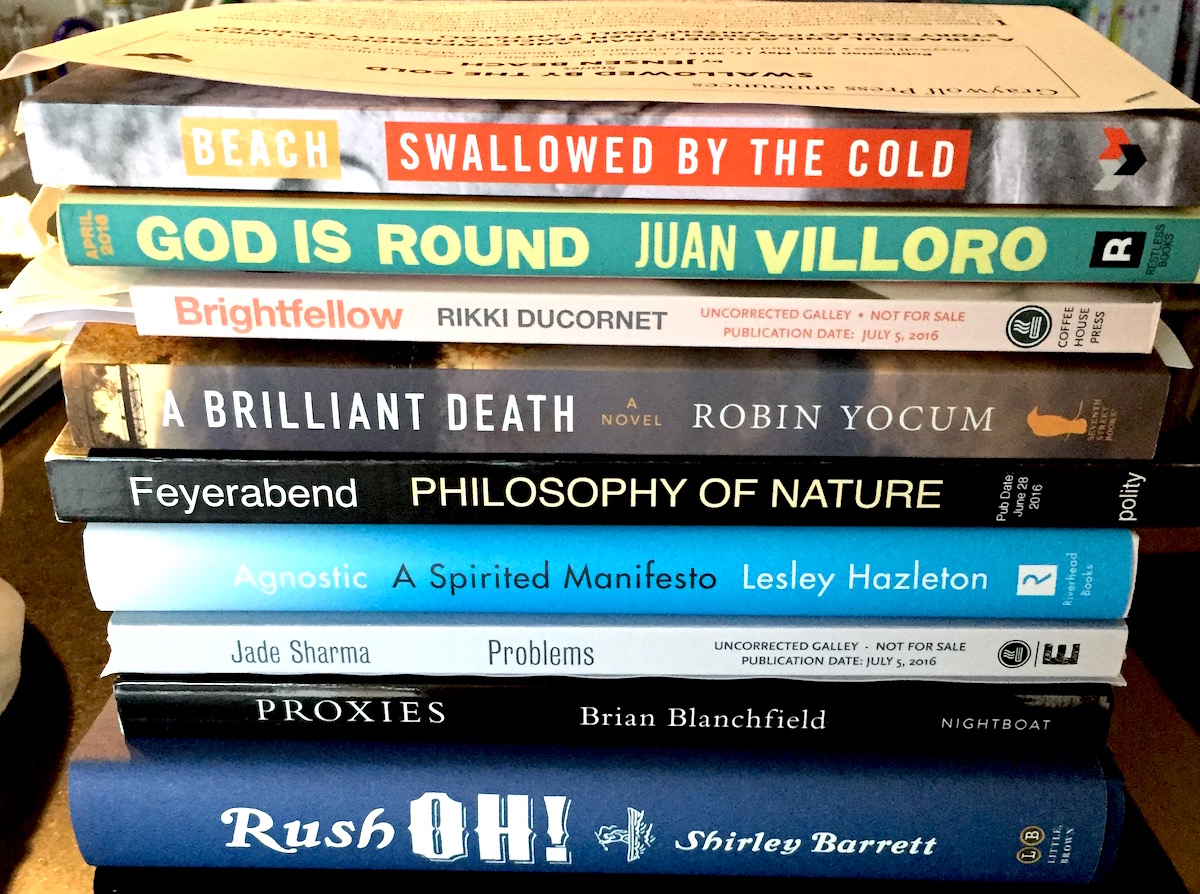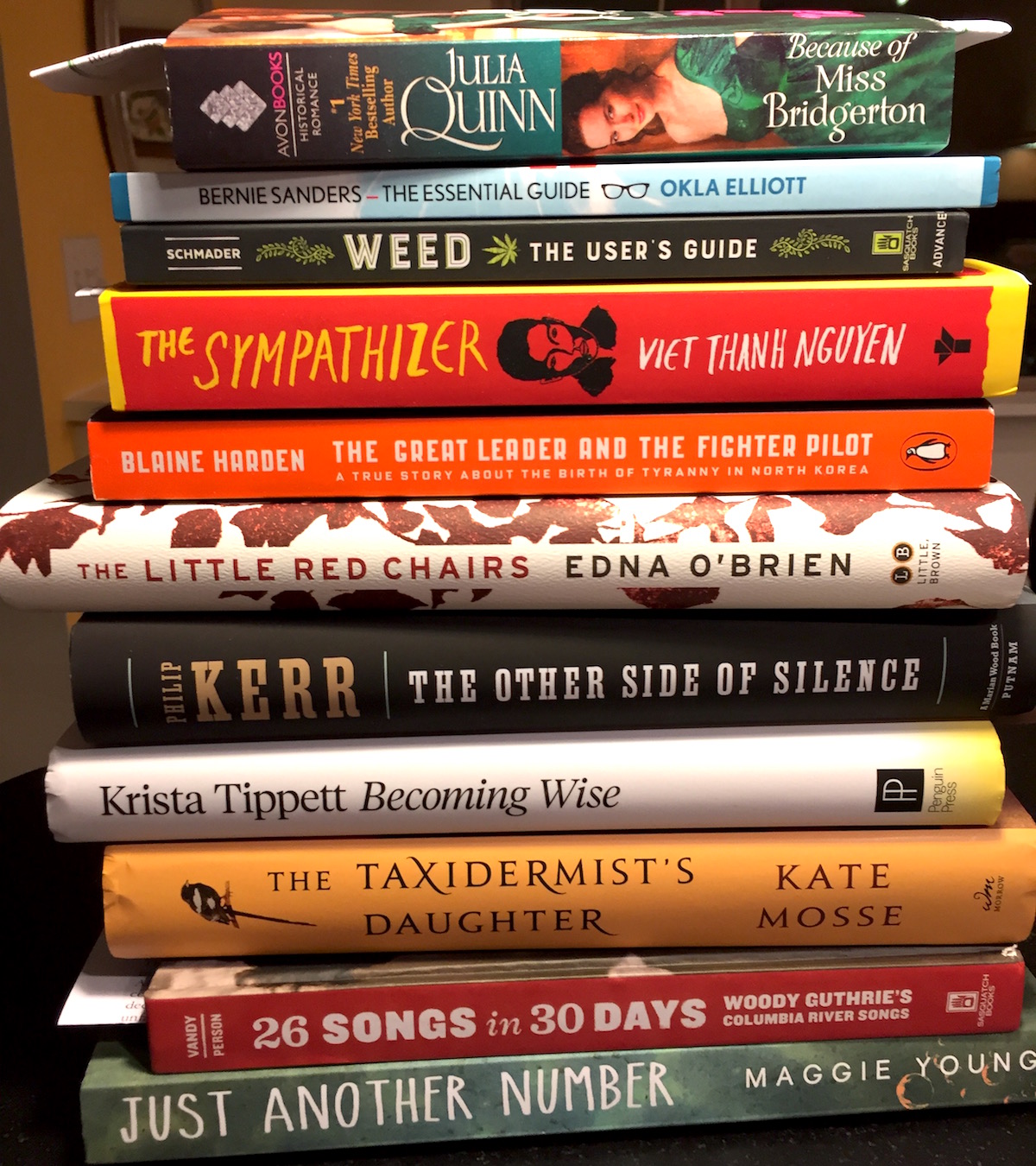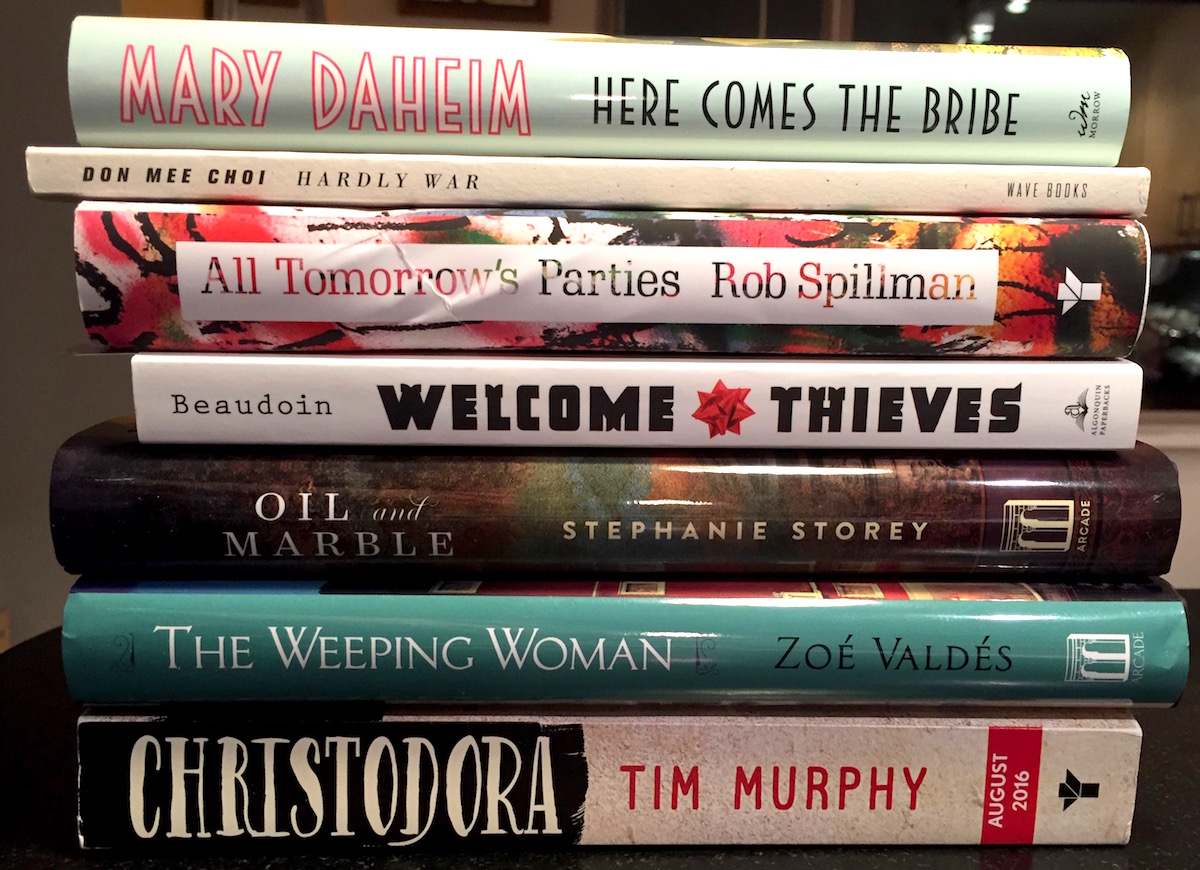In praise of mass market paperbacks
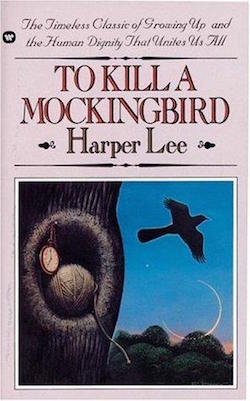
But here's the thing: I prefer mass markets. Always have. I prefer the size — I like how they fit comfortably in the hand. (They can even fit into the back pocket of most pairs of men's jeans.) They're easy to hold, easy to read, and a whole shelf's worth of mass markets, all lined up and of uniform size, are a uniquely beautiful sight. I read all of Kurt Vonnegut's books in mass market. When I went on a Nabokov tear in my early 20s, I actively sought out all of his novels in mass market, because they made Nabokov somehow less intimidating and more approachable.
Rather than running away from them, the publishing industry really ought to be embracing mass market paperbacks right now. While it's true that e-book sales have declined in the last year, publishers would see even more consumer investment in print if they published and promoted cheap, durable paperbacks. Why buy the e-book, after all, if you can get an attractive print version for less?
This is something that genre publishers have known for a long time now — it's why when you think of mass market paperbacks, you likely think of romance novels, or mysteries, or sci-fi. Over the last two decades, publishers have stopped printing literary fiction in mass market format, and I suspect that by avoiding the sub-$10 paperback niche they're ultimately preventing these books from finding a wider audience.
Would books like Catch 22, Portnoy's Complaint, Fear of Flying, and To Kill a Mockingbird have achieved the kind of broad cultural fame that they did without the mass market format? It's entirely possible. But the fact is, publishing those books in mass market certainly didn't hurt their popularity. By scaling down literature, making it fit in the palm of a hand for less than the price of a cheeseburger and fries at a fast casual restaurant, you're certainly opening it up to a new set of potential buyers.
I'm all for books as beautiful objects — hand me a gorgeous McSweeney's hardcover and I'll coo and fondle the thing like anyone else. But I'm also for the utilitarian appeal of a mass market paperback. There's something enticing about the way that all mass markets are basically shaped the same; by standardizing the form of a book to a pragmatic one-size-fits-all receptacle into which the words are poured, you are putting more emphasis on the ideas in the book. And aren't the ideas the point of reading in the first place?
Forget March — APRIL starts tonight
Tonight is the first night of the APRIL Festival, the annual celebration of Authors, Publishers, and Readers of Independent Literature. Now through Sunday, APRIL will be putting on events around Capitol and First Hill. Most of those events are absolutely free. But I wanted to alert you to the two events that are ticketed: Thursday night's "A Poet, a Playwright, a Novelist and a Drag Queen" competitive storytelling event and Friday night's Five-Year Anniversary party.
I'm excited to host Thursday night's event; APRIL's storytelling competition is the only feature that has persisted through all five years of the festival's existence. If you haven't been, it's exactly what it sounds like: three writers and one drag queen tell stories, with the best story selected by a panel of judges. Almost every year, the drag queen wins. (Last year, the poet, Robert Lashley, should have won but did not win.) This year's contestants are Seattle poet EJ Koh, playwright Sara Porkalob, memoirist Brian McGuigan and drag queen Mal DeFleur. The theme for this year's competition is "high five." I can't wait to see how the competitors interpret that. You should buy tickets for this one in advance; these events have been known to sell out early.
And Friday night's fifth anniversary event brings five APRIL all-stars (Ed Skoog, Elissa Ball, Maged Zaher, Robert Lashley, and Sarah Galvin) together with five new-to-APRIL writers (Leena Joshi, Anastacia Tolbert, Hannah Sanghee Park, Bernard Grant, and Jessica Mooney) to read 500 words each. Tickets for this one are five dollars at the door, but if you want to buy $50 VIP tickets, that would help APRIL put on more events like this. I know it seems pricey, but as I said, APRIL doesn't charge admission for most of their events. If you're in a place to pay for VIP tickets, you'd be helping to subsidize all those other great free events that they put on.
And finally, be sure to save some money for Sunday's Book Expo, which will feature booths from all sorts of small publishers, magazines, and other organizations. This is a great, low-stress way for Seattle's literary community to come together and hang out. It's free to enter and you're not required to buy anything — just showing up would be more than enough support. (And The Seattle Review of Books will be hosting a table at this event; we hope you'll drop by and say hi.)
Hunger Rites
I need bread for breakfast, lunch, and dinner.
Sweet grain, salted grain, I want so much
To swallow you whole. I'm a damn sinnerWho can only be saved by your fingers.
Hurry, place the sacred bread on my tongue
And consecrate breakfast, lunch, and dinner —Or maybe not. I wish I were slimmer
And more disciplined — a secular monk!
But I lust, lust and lust. I'm a sinnerWho seeds, threshes, harvests, feasts, and shivers.
Forgive me. Condemn me. I need flesh and blood
And bread at each breakfast, lunch, and dinner.I know I want too much. I know what hinders
And troubles you. But join me in this flood.
Look at me. I'm your beloved sinner.Sit with me. Please. Let's talk. Please. Linger.
Let's touch and eat everything that we touch.
Let us stay through breakfast, lunch, and dinner.
Sweetheart, it's your turn to be the sinner.
The Booker-winning author of novels including Hotel du Lac, Altered States, and The Rules of Engagement died at the age of 87. Brookner had the kind of career to which most novelists should aspire: long, productive, and meaningful. You could choose any one of her books at random and be assured that you're about to read a stylistically powerful, satisfying novel. That's the best kind of legacy.
Book News Roundup: What does Nancy Pearl's ice cream taste like?
Seattle ice creamery Full Tilt debuts a Nancy Pearl-themed ice cream on April 10th, reports Seattle Metropolitan. What does Nancy Pearl ice cream taste like? It's peanut butter with a fudge swirl.
Harper Lee's estate has reportedly killed the mass-market edition of To Kill a Mockingbird. This is going to make the book inaccessible for public schools around the country. What's this mean? Alex Shephard at the New Republic writes:
Why does this matter? Mass-market books are significantly cheaper than their trade paperback counterparts. Hachette’s mass-market paperback of TKAM retails for $8.99, while the trade paperbacks published by Hachette’s rival HarperCollins go for $14.99 and $16.99.
On Friday, On the Media ran an excellent podcast about the publishing industry, featuring interviews with experts about Amazon Books, e-book sales, and other topics. If you're looking for proof that the publishing industry's death has been greatly exaggerated, this podcast is a great place to start.
And while we're talking about podcasts, 99% Invisible's most recent episode explains the culture that has built up around Mein Kampf in post-war Germany. German libraries have a system for dealing with books about sensitive topics. They store the books in what's called a "Giftschrank."
The word, a combination of “poison” and “cabinet,” has a variety of meanings in different contexts. At its most literal, a Giftschrank is a space for storing controlled substances in places like pharmacies. Colloquially, it can refer to spaces reserved for all kinds of hidden and forbidden objects, ideas or stories.
APRIL Festival Starts Tomorrow
This week's sponsor, the APRIL Festival, kicks off with a bang Tuesday night at the Pine Box, with performances by Alejandro de Acosta, Sara Jaffe, Jenny Zhang and Kelly Froh. Doors open at 7:30pm.
Then, every night this week, and into the weekend, the festival goes strong. We have a full event listing on our sponsor's page for you to plan your festival week. We hope, at the very least, to see you on Sunday at the APRIL Book Expo at Hugo House, where the Seattle Review of Books will have a table.
If you're a small publisher, writer, poet, or foundation that is looking to back our work, and advertise your own in an inexpensive and expressive way, take a look at our open dates. We'd love to talk to you about opportunities to sponsor us.
And everything a scenic view
Published March 14, 2016, at 12:01pm
Lia Purpura's poetry is all about looking — the physical act of seeing, yes, but also the deeper inquiry into complication and discomfort.
Give the people what they want: ninjas and haunted things
Audra Gallegos, school librarian at Lawton Elementary School, started out as a teacher. Why’d she make the switch to librarian? Being a teacher “didn’t turn out to be literary enough,” she says. “When WASL became more important, the writing became more dry. It was less about experiencing the world through literature and more about writing essays.”
“I’d always wanted to be a librarian because I’m such a reader,” Gallegos explains, so she took a two-year, part-time certificate program at University of Washington. This is her sixth year as a librarian and her third year at Lawton, and Gallegos knows she made the right decision. School librarian, she says, is “the best job for me. It’s so much fun.” As a high school teacher, she says, “the stakes were so high,” but as a librarian for kids in the K-5 range, she gets to “be a part of their first experience in school,” and to be their first librarian.
Gallegos receives visits from roughly six classes a day. She loves being their first experience with research. “Kids who are four, five, and six tend to be really fixated on certain topics,” she says. “They’ll have these really specific asks.” Like what?
“Recently, there’s this little group of boys and they want books about ninjas. We don’t have a very big collection of books about ninjas for five year olds, so they’ve exhausted our collection.” When she started at her job, Gallegos says she learned that “there are not a lot of early elementary books about ninjas,” but that Mary Pope Osborne, the woman who writes the Magic Tree House series of books, has co-authored a very good book on them.
What are some other trends? “This year, all the kids wanted books on haunted hotels,” Gallegos says. Kids in general are into ghost stories, so she makes sure her library is stocked with “a lot of books about haunted and scary things.” The Nest is a current favorite. “It’s about this boy who gets stung by a wasp and then starts having dreams about this queen wasp who supposedly lives in a wasp’s nest outside his baby brothers’ room, and his baby brother might die,” Gallegos explains. “It’s really creepy. Certain kids just love that stuff.” Graphic novels and books on Minecraft are currently very popular, too.
Gallegos says parents will often ask how to get their kids interested in a different kind of reading. Parents who read novels, she says, will sometimes get upset if their kids only read non-fiction. She tells them all the same thing: parents should “let their kids read what they want. If they want to read graphic novels or Captain Underpants books? That’s reading. Just let them read.”
The local PTA has been very good to Gallegos, providing money for her to add to the school’s collection. She’s so grateful for their assistance: “some schools don’t have book budgets at all.” She talks to school librarians “who have literally no money to buy books, and it seems crazy that there should be a library with no books.”
But if you really want to help your school librarian, Gallegos says, you should volunteer your time. You don’t have to commit many hours a week, she says. “Any help is so great.” She says that parents who contribute just an hour of shelving assistance are always unnecessarily apologetic. She says it’s “like if someone came into your kitchen and washed half of your dishes for you. You’d never say, ‘oh, I’m sorry I only folded half your laundry.’ Every little bit helps,” she says.
The Sunday Post for March 13, 2016
My Year in San Francisco’s $2 Million Secret Society Startup
Lydia Laurenson explores a trip into staged wonder. What's it like, in this modern age, to join a secret society made primarily, so it seems, to evoke the wonder that one might have joining a secret society?
“Can you keep a secret?” I blinked. I didn’t know Justin very well. I did know that he was a very affable bearded man, and we both lived in the Bay Area. At the time, he ran a small creative agency, while I worked as a writer and digital media consultant. “I think so,” I said cautiously. “I think I can keep a secret.” Justin raised his eyebrows. “Of course I can,” I said. “I’ve been thinking about giving you something,” he said. Justin told me he'd been considering giving me a gift for weeks, and finally decided to go through with it after reading an article I’d written about how people use pseudonyms to explore their identities. “But you have to promise me that you won’t tell anyone about it. No one.” I nodded, and he handed me a plastic card—much like a credit card, but pure white with a line of black zeroes. It came in a black slipcase embossed with the words “ABSOLUTE DISCRETION” and a distinctive golden hexagonal symbol.
What Are Trump Fans Really ‘Afraid’ to Say?
The remarkable Lindy West penned a remarkable op-ed for the New York Times. What others make muddled, West presents with such bright-eyed clarity of voice and position that it's hard to imagine how callous one would have to be to disagree with her.
Once you say, “He says what I’m afraid to say,” and point to a man who is essentially a 24/7 fire hose of unequivocal bigotry, you’ve said what you’re afraid to say, so how afraid could you have been in the first place? The phrase is a dodge, a way to acknowledge that you’re aware it’s a little naughty to be a misogynist xenophobe in 2016, while letting like-minded people know, with a conspiratorial wink, that you’re only pretending to care. It’s a wild grab for plausible deniability — how can I be a white supremacist when I’m just your nice grandpa? — an artifact of a culture in which some people believe that it’s worse to be called racist than to be racist.
Will the Los Angeles River Become a Playground for the Rich?
Richard Kreitner looks at the plans to recover the Los Angeles river from the brutulist wasteland it is today, and the political forces that the plans are calling forth.
The Los Angeles River is about to be reborn. Winding 51 miles from the San Fernando Valley past downtown and through South-Central cities like Vernon and Compton, the long-ignored watercourse has become the focus of an explosion of civic imagineering. In 2007, after years of lobbying by a diverse coalition of artists, planners, environmentalists, and social-justice activists, the city approved a master plan that reconceived the abandoned channel as “an urban treasure.” Covering only the 32 miles that pass through the city, the plan envisioned a river that at once provides “flood protection and opportunities for recreational and environmental enhancement, improves the aesthetics of the region, enriches the quality of life for residents, and helps sustain the economy of the region.” Bike lanes and terraced banks were to replace the post-apocalyptic hellscape featured in films like Repo Man and Terminator 2.
FASHIONPEDIA - The Ultimate Fashion Bible - Kickstarter Fund Project #10
Every week, the Seattle Review of Books backs a Kickstarter, and writes up why we picked that particular project. Read more about the project here. Suggest a project by writing to kickstarter at this domain, or by using our contact form.
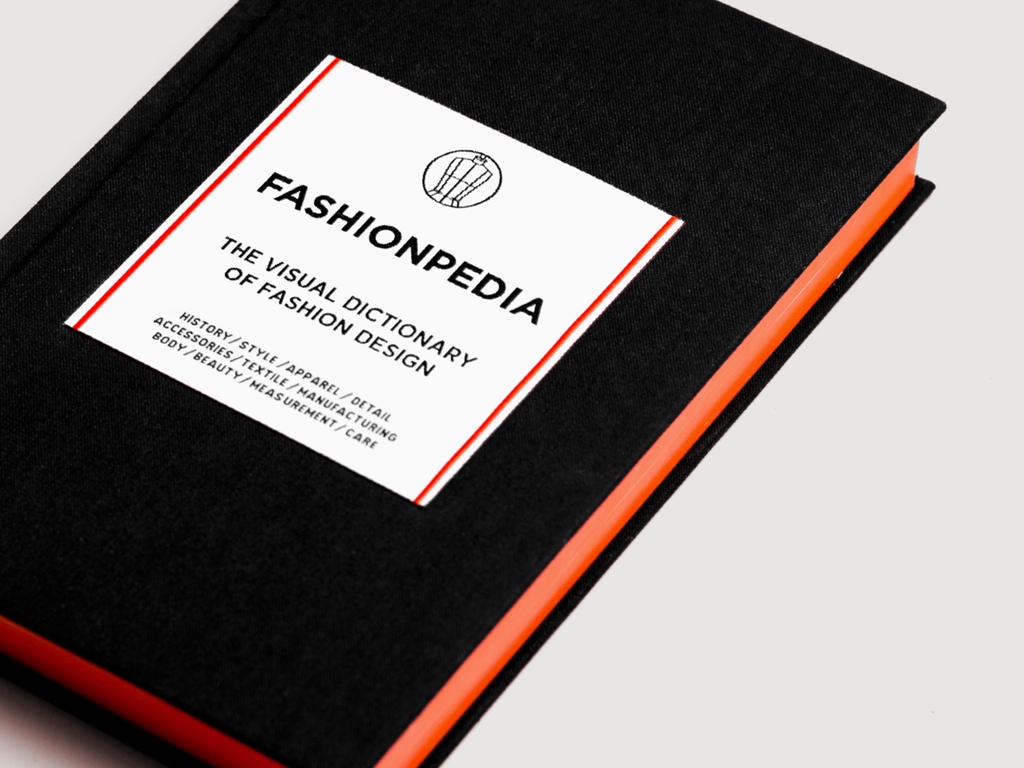
What's the project this week?
FASHIONPEDIA - The Ultimate Fashion Bible. We've put $20 in as a non-reward backer
Who is the Creator?
What do they have to say about the project?
A visual fashion dictionary with extensive information and easy-to-read layout in a compact size. Mini, but mighty.
What caught your eye?
I love visual dictionaries. I mean, my job is a designer, and a well thought-out visual dictionary is one of my favorite books to hold.
I remember seeing a Tumblr post that had diagrams for all the different kinds of, say, ladies shoes, or men's collars, or types of hats. Why is this interesting? Well, I'm a writer, and I want to talk with authority about the things that my characters, some of whom are fashion mavens, are wearing. That means I need to know.
A book like this is even better than some random internet gif. All the detail! All the fashion! All the facts! And, if you're not a writer, maybe you're a fashion designer. Even better.
Why should I back it?
Unless you're like me, maybe you shouldn't. But, if you look at this campaign and kind of go omg this is amazing, like I did, then you probably should. I think it's fair to say this one is totally self selecting. Either you're going to get it or you're not, and if you do, just pointing to it is going to be enough for you to want it. I mean, just look how amazing the design is. Seriously.
How's the project doing?
They're totally kicking ass. 20 days to go, and they've raised about 330% of their initial bid. Look, they don't need you. But, ask yourself, do you need them?
Do they have a video?
Kickstarter Fund Stats
- Projects backed: 10
- Funds pledged: $200
- Funds collected: $120
- Unsuccessful pledges: 0
- Fund balance: $840
In teacher mode, Susan Orlean delighted at Hugo House last night
Susan Orlean closed her talk at Hugo House by quoting something she said she'd hope to someday turn into a bumper sticker. "Writing is life. Approach your writing in the best way you can imagine approaching life. Ears open, eyes wide."
Kind of long for a bumper sticker, but not for a talk she delivered to a captivated crowd at Hugo House last night. Perhaps she could, instead, make a series of bumper stickers each with one of her three operating principles about writing, which she opened with. They were the heart of her talk:
- Writing is a way of being in the world.
- Writing is first being a student, then being a teacher.
- Writing should favor inquiry over expertise.
For Orlean, writing is a form of discovery. Using the example of taxidermy, she talked about finding a friend's catalog of supplies ("noses, eyeballs") and feeling surprised that "there were more than two taxidermists in America." A Google search uncovered the World Taxidermy Championships competition happening in a week's time.
Watching Orlean talk about the flush of curiosity, fascination, and excitement at the moment of discovery made it easy to picture her, the next morning, entering David Remnick's office, barely able to contain herself.
"I want to write about taxidermy."
And then, Remnick, after a moment. "I'll have to check if I have anybody on that."
She walked into the convention knowing nothing. She feels that studying beforehand only serves to pull her out of the moment she's having with the real people she's meeting. This requires her to be ignorant in the face of experts. It requires, she says, a great amount of humility, and experiencing the rolled eyes of the experts who probably who, thankfully, suffer through explaining it to her. And, the article that followed ran in the magazine in 2003.
There's a moment in her research when the formally steep learning curve starts to flatten, and that's when she says she's ready to start writing. Her goal is to seduce people. To lure them in and show what she saw. To show, and never to explain.
She embeds very consciously through the prices the code words and messages needed to tell the story. Partially, she does this to avoid the "nut graph", which you will never find in her stories, but mostly to keep the reader intoxicated and close, to make them feel as if she was telling the story just to them. Something she learned from early readings of John McPhee, who seemed to be writing just for her, as she read.
Orlean is a charming person, funny, present, and open. Her success, surely, is part due to her well applied brilliance, but it also has something to do with the sheer size of her ovaries. Most of her pitches follow the lines of "I know this sounds crazy, but I want to write about ___. You have to trust me." She not only sells it, but she delivers, time and time again.
Having her was another coup for Hugo House, and another amazing get for curator of events Peter Mountford, capping off a season of visits from other prestigious writers like Maggie Nelson, Daniel Handler, and Jonathan Lethem.
Orlean talked for almost an hour, then after a break, sat down with memoirist Claire Dederer to answer more questions about craft, process, and her general outlook, before taking a few audience questions.
An audience member asked her about failure, and those ideas that just didn't pan out. It was like she didn't understand the question (she totally understood the question). She talked setbacks, and how editors often encouraged her to keep going when she felt all was lost. But she never talked about abandoning an idea. She always presses through the thicket to find the path.
It would seem, in Orleans' case, that a project about to fail is an opportunity to uncover another angle. We witnessed it in practice last night. According to a few whispers around the room, but unbeknownst to the general audience last night: Orleans didn't know she was supposed to deliver a speech before the interview until she arrived in Seattle. Her lecture was entirely extemporaneous and unpracticed. Which, for a nearly flawless and inspirational talk, only makes you appreciate her all the more.
The Help Desk: Kingsolver? I can't even Kingstander!
Every Friday, Cienna Madrid offers solutions to life’s most vexing literary problems. Do you need a book recommendation to send your worst cousin on her birthday? Is it okay to read erotica on public transit? Cienna can help. Send your questions to advice@seattlereviewofbooks.com.
Dear Cienna,
Maybe you covered this before, but, if not, I need help. My husband and I read The Poisonwood Bible, and I loved it and he hated it. Sure, you know, individual tastes and whatnot, but it’s more than that. I mean, we disagree over movies all the time and manage to keep it light. But my goodness, he hated it. To me, it read as an affirmation of life and the struggles women have faced, and so when he gets all aggro about how much it sucks and there are no good men in it, so it’s sexist, it’s kind of like he’s attacking me. So, that’s weird. How can I get over myself?
Molly on Magnolia
Dear Molly,
My apologies. I have avoided your question for weeks, much as I avoid questions like “Why do you blame your daddy issues on your mother?” and “What’s the capitol of Minnesota?” — because there is simply no easy answer. You see, I also harbor an irrational hatred of The Poisonwood Bible. Intellectually, I can appreciate Kingsolver’s mastery of having five unique female narrators and, as you pointed out, her focus on the plight of women (not just in this book but others). But yeah, I can’t stand any of her books. I think I suffered a rage blackout for the entirety of Prodigal Summer. I have brought Mrs. Kingsolver as my guest to quite a few book burnings over the years.
That said, your husband’s justification that The Poisonwood Bible sucks because it’s sexist is a hot load of horeshit. Tell your husband books can’t discriminate against fictional men. He can dislike a book for good reasons or no reason at all, but inventing nonsense reasons just makes him look like a turd. (Also, how many popular books, television shows, movies, etc. feature absolutely no relatable, wholly-developed, “good” women in them? Too many to count. If your husband can’t relate to a book simply because of the gender of its main characters, he’s the sexist one.)
But to your question: How do I get over myself? I don’t think you should have to. Your emotional response to the book is what all writers hope for from their readers. You get to treasure that feeling. Your husband didn’t respond to it that way, much as I didn’t. So now he needs to do the polite and loving thing, which is fuck right off and not ruin your afterglow.
Kisses,
Cienna
A city holds its breath
Published March 11, 2016, at 10:23am
San Francisco's Streetopia exhibition tried to imagine a better, more utopian city. Is it time to wonder what a utopian Seattle would look like?
Portrait Gallery: Susan Orlean
Each week, Christine Marie Larsen creates a new portrait of an author for us. Have any favorites you’d love to see immortalized? Let us know.
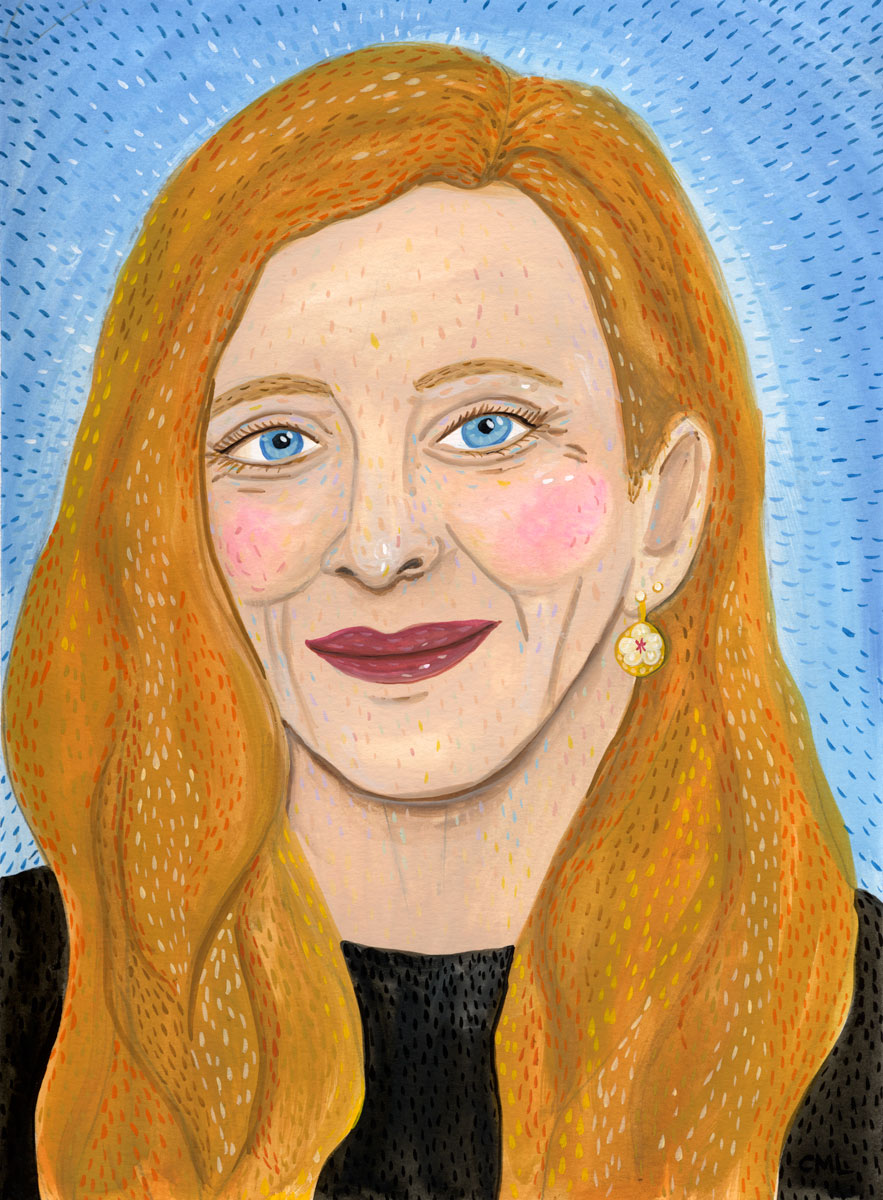
Susan Orlean appears tonight at Hugo House to give a talk on craft. You're going, right?
Staring across a border, looking at a wall
Published March 10, 2016, at 12:00pm
With politicians mouthing off about the border, what if we listened to stories from people who live there?
Mail Bag: A real librarian weighs in
A few weeks ago in her Help Desk column, Cienna Madrid responded to a question from Alyssa about tidying up the neighborhood Little Free Library. Today's Mail Bag is from an actual librarian. You can always read more of Cienna's columns on her archive page, and reach out to us if you'd like to comment on anything we publish.
Dear Cienna —I greatly enjoy your column. Your advice to the person who wrote in about inappropriate stuff in the local Little Free Library and wanting to clean it out was right on, except for one aspect I disagree with: she should not tape a note to the LFL about her plans to clean it out.
Here's what I've observed as a professional book person: other people tend to believe books are sacred objects, and that all books have worth and must be preserved. That's not true. Look, I love them, but after a certain point books are just rotting piles of paper giving off weird smells and luring roaches to your house. Boxes of books that have been in the garage for 25 years have no monetary worth and little intrinsic usefulness, yet people persist in believing someone else will want to read a brittle, smelly paperback by some dead author. As a librarian, part of my job is assuming their recycling guilt. I accept this.
I don't know what kind of weaponry one brings to a neighborhood book fight, so best sidestep all together. Let the neighbors believe that someone from the future came across the Windows 99 user books and took back to sell or crack Bill Gates' files, and the original letter writer should pat herself on the back and hide the culls under a pizza box.
Sincerely,
Kerry Howell
MLIS
Cienna responds:
Dear Kerry,
You are absolutely right: people place too much importance on books as sacred objects. That is why I am a firm believer in, and advocate of, book burnings. There's nothing more heartwarming than a community bonfire filled with musty books, hosted somewhere roomy like the parking lot of a generous church. They turn the solitary act of reading into an activity the whole family can enjoy!
Seattle people are especially fussy about their garbage. (That is why everyone now owns at least three trashcans.) The note was a formality to buffer the sender, Alyssa, from getting yelled at by fussy people who don't want their tiny garbage temple messed with. But in an ideal world, that note would be unnecessary, librarians would curate top-notch book burnings on top of all the other great work they do, and I would have my pinkies replaced with rattlesnake rattles.
Thank you for writing, Kerry, and for your service.
Kisses,
Cienna
Thursday Comics Hangover: Doctor's orders
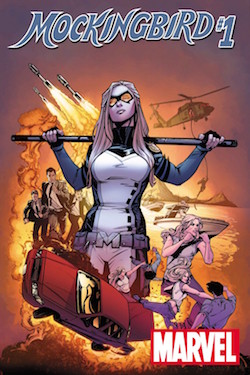
Mockingbird feels like the first chapter to a well-structured story. Most of the book takes place in a doctor’s office; Mockingbird is called in for frequent checkups due to her exposure to a volatile super soldier serum in her origin story. (She asks the reader in one caption: “If you could live forever but had to have a colonoscopy every week for the rest of your life would you do it?”) The book has an irreverent sense of humor to it. Tony Stark, in the opening scene, sits in the same waiting room as Mockingbird, casually flipping through a pamphlet on gonorrhea. The book skips forward in time through several of Mockingbird’s doctor visits. Her health deteriorates, but she lies to her doctors about it. Supposedly important events happen in between the visits, but we don’t know what they are. One of them involves a corgi.
In a note at the end of the issue, Cain admits that the first issue “makes no sense,” which is selling herself short. She explains that the next three issues of the story will spell out what happens in between each of the doctor visits, and then the fifth issue will tie the whole story together. It’s kind of a shame that Cain felt compelled to give away the structure of the story in a prose piece at the end of the first issue, but the volatility of the comics market probably demanded it; mainstream comics are selling so poorly nowadays that new series might not even get five issues with which to prove themselves.
Mockingbird is a series that deserves to survive. Unlike most novelists who break into comics, Cain is excellent at the form; she doesn’t overwhelm the reader with too many words, and she trusts her artist to tell the bulk of the story. The artist, Kate Niemczyk, is especially good at drawing people: her characters are eminently watchable, with lively body language and expressive faces. Niemczyk also pulls off some fun iconography tricks later in the issue, which help demonstrate the increasing mental pressure on Mockinbird to perform correctly during her medical examinations.
The coloring by Rachelle Rosenberg, too, is exceptional. It feels, and I mean this as a compliment, very comic-book-y, with a lot of vivid primary colors throughout. But Rosenberg also lays down quite a few patterns in the issue — a swirly circle pattern on one nurse’s scrubs, a floral pattern in one office, a beautifully garish explosion pattern behind Mockingbird in a climactic panel — that add to the atmosphere of intricacy.
Together, the three creators manage to tell a psychologically engrossing spy story told almost entirely in visits to a health care provider. The drifting sense of loyalty you find in most good espionage thrillers works exceptionally well in a medical setting. Everybody lies to their doctor, as Mockingbird notes in the issue, but what if your doctor was actively plotting against you? Worse, what if you couldn’t tell if your doctor was trying to do you in or not? It’s enough to make somebody sick.
